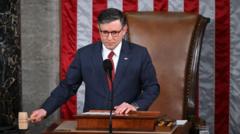Republican Mike Johnson has been re-elected as House Speaker after a tense and closely contested vote that showcased the challenges facing the GOP in Congress. The outcome of the vote marked a shift towards complete Republican control in Washington, coming just ahead of President-elect Donald Trump’s revival of an agenda centered around conservative principles.
Johnson, representing Louisiana, could afford to lose only two votes due to the razor-thin majority held by Republicans in the House. During the seat's contest, he faced significant hurdles, including a hard 'no' vote from Congressman Thomas Massie of Kentucky, who adamantly refused to support Johnson's re-election. Furthermore, several other lawmakers were categorized as 'undecided' as the vote approached, heightening the anticipation around the election outcome.
Initially, Johnson struggled to gain the necessary 218 votes, securing only a fraction of the Republican support in the early rounds. Massie, along with Representatives Ralph Norman of South Carolina and Keith Self of Texas, named alternative candidates for the speakership, adding to the drama. To turn the tide, Johnson took decisive action by leaving the House floor to lobby fellow members to rally behind his candidacy.
After a short interlude, Johnson's appeal bore fruit; both Norman and Self switched their votes to support him, allowing Johnson to successfully clinch re-election. Norman later explained that discussions with Johnson in a separate room helped change his mind regarding the speakership, emphasizing promises of increased conservative representation in future negotiations.
The speaker vote was significantly influenced by external pressures, such as direct involvement from President-elect Donald Trump. Norman revealed that Trump passionately encouraged Republicans, highlighting the unique opportunity for the party with both chambers and the presidency under their control. Trump's endorsement, noted for its weight within GOP ranks, was considered instrumental in encouraging the wavering lawmakers.
With Johnson's victory, the newly seated 119th Congress stands on the brink of implementing a bold conservative agenda, heavily inspired by Trump’s policies. In his acceptance remarks, Johnson embraced the "America First" perspective, reflecting on the demands of the electorate for prioritizing national interests.
This vote also signals critical developments in the GOP's strategy moving forward, including the anticipated formation of a working group of experts to audit federal spending and enhance transparency—initiatives outlined by Johnson ahead of the vote.
The importance of electing a House Speaker cannot be overstated, as previously chaotic disputes over leadership have resulted in lengthy and contentious voting processes, exemplified by the 15 rounds required for former Speaker Kevin McCarthy's confirmation. As the new Congress begins its term, Johnson's leadership could set the tone for a unified Republican front or reveal underlying fractures within the party.




















